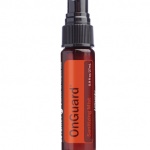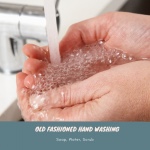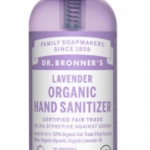FIVE THINGS TO THROW AWAY TODAY THAT MAY BE AFFECTING YOUR HEALTH
- jules
- Jun 17, 2019
- 7 min read
** I am a Wellness Advocate with dōTERRA Essential Oils and will receive compensation from any purchases made as a result of this blog post. I participate in the Amazon Associate program and links will result in my compensation. This compensation is used to support my business, website, and blog. I was not paid to write this post, these are my own opinions and suggestions.
Toxins, Chemicals, and Disruptors Oh my……

Years ago I was sitting around a table coffee klatching and friends and I were discussing a variety of things. During that conversation, we stumbled upon the idea of ridding our home of chemicals. My science-y brain jumped in and argued that you can’t “rid your house of all chemicals” because chemistry is the foundation of all things. I was thinking of the basic idea of the Periodic Table of Elements and chemicals compounds.
This whole thought process perpetuated my desire to share the idea of reducing toxins (harmful chemicals) in your home that may act as endocrine disruptors or have other negative effects on your health.
I am sure at this point, you might be saying – What the BLEEP are you talking about??? This article is going to look at a few basic household products as opposed to anything that we may ingest as part of our diet. So here is the quick, down and dirty on why this even matters and how some systems in our body work to keep us healthy. All the parts of our body are like a jigsaw puzzle…. they all intricately fit together to create something beautiful – YOU! It is your responsibility to take care of YOU to ensure the best health and best quality of life now and in the future.
So, Let’s do a quick breakdown (its actually a bit of a deep dive, but worth understanding)
Cells
“Cells are the basic building blocks of all living things. The human body is composed of trillions of cells. They provide structure for the body, take in nutrients from food, convert those nutrients into energy, and carry out specialized functions. Cells also contain the body’s hereditary material and can make copies of themselves.” – https://ghr.nlm.nih.gov/primer/basics/cell
The energy center of our cells are little parts called the mitochondria. If the mitochondria aren’t healthy, our cells won’t be healthy. How the mitochondria receive and relay information can be directly related to the endocrine system.
The Endocrine System
“Although we rarely think about the endocrine system, it influences almost every cell, organ, and function of our bodies. The endocrine system plays a role in regulating mood, growth and development, tissue function, metabolism, and sexual function and reproductive processes. In general, the endocrine system is in charge of body processes that happen slowly, such as cell growth.” – www.kidshealth.org
The organs that are part of the endocrine system are: thyroid, parathyroid, pancreas, adrenal glands, pituitary gland, reproductive glands, and the hypothalamus. Some of these might sound familiar and some might not. But they are all important in regulating our body and maintaining a healthy environment for our cells to be the healthiest possible. When there is something interfering with these organs, it can ultimately effect the entire health of our body by eroding healthy cells over time. The chemicals secreted by these different glands are carried throughout the body to specific cells that are designed to bind with hormones released by these glands. Once they bind to the cell, it transmits chemical instructions to the cell. These instructions are what help the cell maintain health and vitality. If the instructions are not received properly, or in the correct amount, many things can go wrong in the body. Some of these can present themselves as symptoms or diseases.
They can include:
fatigue
weakness
abdominal pain
skin issues
dehydration
foggy thinking
diabetes
growth problems
immune system
issues including autoimmune diseases
The Respiratory System
This is the system responsible for breathing in air, absorbing oxygen, and expelling carbon dioxide. “For the lungs to preform their best, these airways need… to be open and free from inflammation or swelling and excess of abnormal amounts of mucus.” –https://www.webmd.com/lung/how-we-breathe
The bottom line is – if our respiratory system is compromised and we can’t get the oxygen all the cells need in our body, they will begin to suffer. It is absolutely essential, critical, and fundamental! It is the basic fuel for each and every cell…. for each system in our body to function at its best. Without the proper amount of oxygen your cells don’t function at their best, they lack the energy needed to repair DNA and the result can be a compromised immune system and disease.
Our immune system and gut connection
Our immune system is by far one of the most complex and confusing systems in our body. There is a ton of research happening around the immune system. The immune system is our body’s defense mechanism. “It’s job is to neutralize pathogens like bacteria, viruses, parasites, or fungi that have entered the body and removing them from the body.” – https://www.ncbi.nlm.nih.gov/pubmedhealth/PMHT0025680/
One of the biggest areas of research happening at academic and medical facilities across the globe is the study of how our immune system is connected to our microbiome. “…how gut microbial imbalance (dysbiosis) may lead to dysfunction of host machineries, thereby contributing to pathogenesis and/or progression toward a broad spectrum of diseases.” – https://www.ncbi.nlm.nih.gov/pubmed/30154767
The microbiome is the colony of tiny cells that live in our body. Studies have revealed that microbial cells out number human cells by about ten to one. As such, each cell of microbiota has its own DNA that interacts with our body and plays a huge role in our health. In fact, it is now understood that approximately 50-70% of our immune system is based in our gut. So, taking care of maintaining the colony of these little bacteria, called our microbiome, is one of the most most important things we can do for our health.
So now that you have a basic understanding of some anatomy & physiology, let’s jump in and find out ways to take care of it.
5 Household products to ditch now
Air Fresheners
Over 80% of indoor air fresheners are known to contain a chemical known as phthalates. Phthalates are well known to disrupt hormones in our bodies. A recent study concluded: “Collectively, these results suggest a potential adverse effects of low dose phthalates on the thyroid.” – https://www.ncbi.nlm.nih.gov/pubmed/30078309
They are also being studied to determine their possible risk for allergies, asthma, and toxicity levels in animals.
In addition, some air fresheners may contain formaldehyde or similar chemicals such as VOCs and naphthalene. These are well known chemicals that can have harmful effects on our bodies including the endocrine, respiratory, and immune systems.

ALTERNATIVE: diffuse natural essential oils, use electronic air cleaners, keep house plants that naturally clean the air such as spider plants
Deodorants
There are ingredients that are commonly found in deodorants that can have disruptive effects on the body.
Parabenspropylene glycolphthalates (commonly disguised on the ingredient list as “fragrance”)
Large publications such as Time Magazine have even highlighted articles detailing the possible effects of ingredients found in common deodorants. The evidence is inconclusive at this time as to if ingredients such as aluminum have a direct link to cancer or dimentia. However, it is clear that some of the active ingredients such as parabens can disrupt or interfere with hormones such as estrogen or testosterone. These chemicals have also been known to cause oxidative stress in the body, which can lead to disease such as cancer. While it does not clearly “prove” a direct link, it is concern enough for me to avoid these chemicals to minimize possible disruptions in my body.
In addition, deodorants in essence stop bacterial function.
ALTERNATIVE: natural deodorants free from above chemicals, homemade deodorant, natural wipes for periodic cleaning throughout the day or after activity
Dryer Sheets
While this is a highly debated topic, there are studies that have been completed that have found chemicals such as acetaldehyde and benzene. This article by Dr. Axeoutlines the details in great length. Not only are these chemicals being emitted into the air, but the residue remains on your clothes and can absorb into your body through your skin. This can cause skin irritation, allergies, and slowly effect other organs such as your endocrine system.

ALTERNATIVE: wool dryer balls, line dry clothes, add baking soda to the wash cycle to decrease static, DIY essential oil citrus laundry softener
Household Cleaning Products
Recent news hit earlier this year when research pointed to long term decline in lung function due to cleaning products used at home and work. This was covered by major news outlets such as NBC, Reuters, Newsweek and more. The findings recognized short term effects on people that suffer from compromised respiratory health such as asthma. However, this new study suggests that regular exposure to household cleaning sprays may show a decline in lung function, similar to that of smoking cigarettes.
Click here to view the Environmental Working Group’s Hall of Shame.
Some of the chemicals found in common household cleaners include 2-butoxyethanol, nonylphenol, ethoxylate, ethanolamine, and formalin. WHAT – I don’t even know what these are or how to pronounce them correctly. Many of these ingredients have been banned by the European Union and can produce high level air irritants that can persist in the environment for extended periods of time. In addition, several of these aerosol products may contain inhalants, commonly abused by teens and can be potentially fatal. Some of these products also emit other chemicals when tested that don’t even appear on the label! –
A recent study in the Canadian Medical Association Journal sought to identify the possible relationship between household cleaners, children’s gut health (microbiome) and obesity. The study found that “antibacterial cleaning products have the capacity to change the environmental microbiome and alter the risk for child overweight.” – Canadian Medical Association Journal v.190 issue 37, 17 sept 2018.

ALTERNATIVE: Norwex, vinegar, baking soda, home made cleaners with essential oils, DIY cleaner wipes
Hand Sanitizer
Many common hand sanitizers contained the ingredient, Triclosan. This has recently been recognized to cause skin issues, disruption in thyroid hormones and possible antibiotic resistance. Other hand sanitizers can kill not only bad, but good bacteria in our microbiome. As such, they should be used sparingly and when soap and water are truly unavailable.
ALTERNATIVE: natural hand sanitizers such as Dr. Bonner Hand Sanitizer or essential oil hand sanitizer, DIY hand sanitizers or good old fashioned hand washing
I don’t know about you, but if I have the opportunity to reduce my risk by making different choices, I’m all for it. Many times, these alternatives are not only better for you, save money, but also for the environment. Join me in making change for a better home and healthier YOU!







Comments